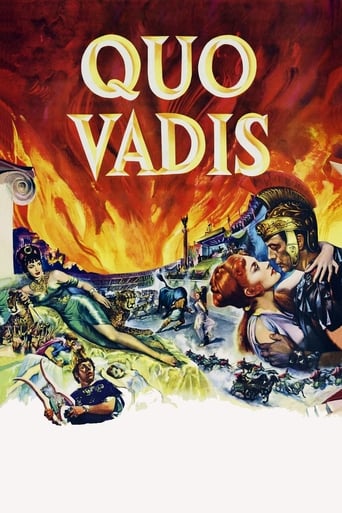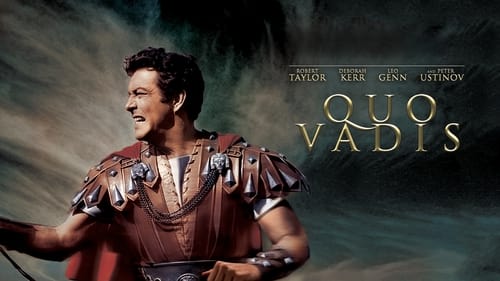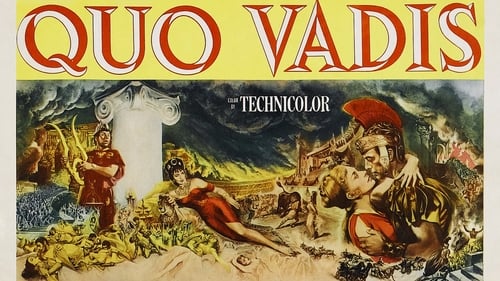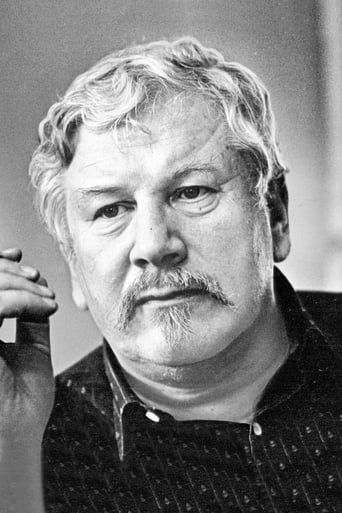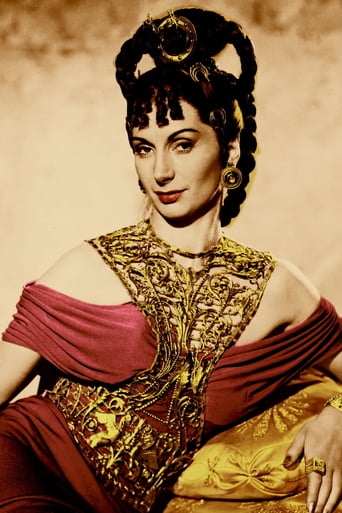WasAnnon
Slow pace in the most part of the movie.
Sexyloutak
Absolutely the worst movie.
Helloturia
I have absolutely never seen anything like this movie before. You have to see this movie.
Skyler
Great movie. Not sure what people expected but I found it highly entertaining.
JohnHowardReid
Copyright 4 December 1951 by Loew's Inc. An M-G-M picture. New York opening simultaneously at the Astor and Capitol: 8 November 1951. U.K. release: 28 September 1952. Australian release: 19 December 1952 (sic). Sydney opening at the Liberty. 171 minutes.SYNOPSIS: In the first century A.D., Marcus Vinicius, commander of the victorious Roman legions, returns to Rome after his conquests in Britain. He is honored by the Empress Poppaea. Soon he meets and falls in love with Lygia, a Christian hostage and the daughter of a defeated king. She spurns him because of his pagan ways. He the contrives to have Lygia given to him as a slave. But she still refuses to yield to him. Later Marcus follows Lygia to a meeting of the Christians where a sermon by the apostle Peter gives him a better understanding of her religious beliefs. She eventually falls in love with Marcus and consents to become his wife. However, he leaves her in anger when she refuses to abandon her Christian faith. Yet when the mad Emperor Nero sets fire to Rome, Marcus rushes to Lygia's rescue. NOTES: Negative cost: $7 million (including $2 million for an abandoned 1949 version produced by Arthur Hornblow and directed by John Huston, starring Gregory Peck and Elizabeth Taylor).Initial domestic rentals gross: $10.5 million, making it number 2 at the U.S./Canadian box-office for 1952. Equal 4th (with another Robert Taylor epic Ivanhoe) at U.K. ticket windows.Nominated for the following prestigious Hollywood awards: Best Picture (lost to An American in Paris); Best Supporting Actor, Leo Genn (lost to Karl Malden in A Streetcar Named Desire); Best Supporting Actor, Peter Ustinov; Best Color Cinematography (lost to An American in Paris); Color Art Direction (Also lost to An American in Paris); Film Editing (lost to A Place in the Sun); Music Scoring of a Drama or Comedy (also lost to A Place in the Sun); Color Costume Design (lost to An American in Paris).Number 8 in The Film Daily's annual poll of American film critics. Number 9 on the National Board of Review's Ten Best list.Filmed in Italy, at Rome's Cinecitta Studios.COMMENT: This, the first and only sound version of a once super- popular 1896 novel, inaugurated the Hollywood craze for spectacles. It established a formula, faithfully followed in most other epics of ancient and medieval pageantry: (1) Pots of money spent on sets, effects and costumes; (2) prestige actors in lead roles; (3) an always super-glossy but only occasionally imaginative technical finish; (4) an invariably weak script, often with quasi-religious shadings, in which one-dimensional characters muse at length in quaint English on the meanings of love, life, commitment and destiny.Quo Vadis is more entertaining than most of its successors. Although the love story is even more flaccid than usual — Miss Kerr makes her heroine boringly insipid — it does have some uncommonly strong performances, especially from Peter Ustinov, Leo Genn (this was the movie that made them both super-stars, though Mr Genn's reign proved less durable than the far more flamboyant Ustinov's), Patricia Laffan, Buddy Baer (his best role ever), and the ever-reliable Robert Taylor.On the whole, it's Ustinov who makes the most impression. His is by far the most colorful character. He has all the best business and lines — and makes the crowd-pleasing most of them!And of course there's the spectacle elements: richly vivid sets, hordes of extras, see Nero fiddling whilst Rome burns, Christians thrown to the lions, all that sort of stuff, expensively re-staged — and indelibly cheapened in the process. AVAILABLE on an excellent Warner DVD.
Marian20
Robert Taylor and Deborah Kerr together with Peter Ustinov star in this movie adaption of Henryk Sienkiewicz's classic 1896 novel entitled "Quo Vadis".This tells the story of a love story between an agnostic Roman soldier Marcus Vinicius and a Christian woman Lygia during a time wherein Emperor Nero was into the persecution of Early Christians during the first century. Mervyn LeRoy was the director of the classic epic film released in 1951.No question that Quo Vadis remains a popular film after more than 60 years since it has been released.It provides a great depiction of the persecution and martyrdom of the Early Christians during the time of Emperor Nero.We also witness great acting from the stars particularly Robert Taylor and Deborah Kerr as they provided a great performance of the lead characters Marcus Vinicius and Lygia and most especially Peter Ustinov as cruel and insane Emperor Nero.No wonder that Ustinov won one of the eight Oscars that movie has garnered in 1952 particularly that year's Best Supporting Actor as well as Best Picture. Added to that,a viewer can see that great money has been spent on its production particularly its costumes,production set up and cinematography. It also was shot on location in Rome where the story took place.Finally,it has also great and memorable historic scenes such as the burning of Rome and the crucifixion of Saint Peter upside down.Overall,it is one of the best movies ever released.
stormhawk2018
Of the half-dozen film versions that have been made from the novel by Nobel Prize winner, the Polish Henryk Sienkiewicz (1846-1916), the most successful and widespread was that of Mervyn LeRoy. Counting on the cast with such star-studded figures as Robert Taylor, Deborah Kerr and Peter Ustinov, he adapted the grandiose epic and romantic story set in the era of decline and disappearance of the first dynasty of Roman emperors (Julius-Claudius, 27 BC-68 AD), of which the last was Nero. In the middle of the splendor and expansion of one of the most powerful empires that ever existed, a young patrician and Roman soldier falls in love with a beautiful foreign host in a Christian home. He will soon understand, to his great disappointment and torment, that he will not be able to seduce her like any Roman woman, nor make her his mistress. These are hard times. Nero is a bad emperor. His mental disorders and his excesses are leading to Rome to chaos and ruin. He is surrounded by both competent men (the elegant, epicurean and intelligent Petronius, the great philosopher Seneca) who try to breathe in some sanity, as ambitious men who seek only their own recognition. Nero's delusions outline a threat that will soon become a reality. All Rome will pay a very high price. Both the fire that will devour the city, and the arrest and extermination of many Christians who live peacefully with the rest of the population, will mark a deadly time. Ligia, the beloved of the soldier Vinicio, is Christian, with which it is in serious danger. He, leaving behind his résumé of superfluous delights, throws himself head first to his authentic love and, realizing that he can only earn it with his heart, will do everything possible to save her from the city threatened by fire and the clutches of the Collective madness that is wreaking havoc with the Christians, making them suffer for believing them the authors of the catastrophe that destroys Rome. This epic drama is a reflection of an era in which Christianity had expanded enormously and was beginning to suffer the consequences of constituting a form of religious worship that was still seen in Rome with suspicion. It is also the reflection of the end of the first imperial period that happened to the Roman Republic, with the intermediate transition of Julius Caesar. A love that has to overcome great obstacles, the progressive maturity and religious conversion of a man deeply in love, the exaltation of the new faith, the annihilation of reason and peace at the hands of a lunatic ruler, and the destruction of much more Which is the most important city in the world. The fall of past beauty, of a past glory that is consumed in the flames and vanishes with smoke. Nothing will be the same. But the cycles are always renewed, and new lives and new illusions will continue walking along the path of the times, becoming the eternal question: "Where we go?"
elvircorhodzic
QUO VADIS is a very ambitious film spectacle of questionable quality. This is a kind of combination of facts and historical and biblical context. The film offers a fairly good set design, sound, soundtrack and great costumes. Historically - epic moments are well highlighted. This three-hour film offers exceptional dynamism and narrative clarity. However, despite the, until then, an unprecedented visual splendor and excitement of the film are frequent moments of verbal boredom, banality, historical pretentiousness and an indication of sex.The story boils down to the antagonistic relationship Roman generals and converts to Christianity, the bloody rule of mad Emperor Nero and religious spices. Realizing at the same time intimate drama of two people and the spectacular scenes of historical events, such masterful staging of Nero's burning of Rome and the events at the Coliseum, LeRoy is presented actually a classic love story, no matter what its context has an epic importance, both in terms of history, and as far as religion.The film shows the extremes of human madness, brutality, morbidity and cynicism on the one hand. On the other hand extremes of human justice, commitment, faith and goodness. I think that so many things in the film well conceived and unfortunately remained incomplete.The most complete character is Petronius (Leo Genn), who cynical bickering his supervisor creates knowledge about the reality. Convincing and touching is his fragile romance with a slave Eunice (Marina Berti).Peter Ustinov as Nero is in certain parts of the film quite interesting. However, this restraint, madness and screaming become irritating and annoying. In this character has no visible changes. Treadmill is a real denominated.Robert Taylor (Marcus Vinicius) and Deborah Kerr (Lygia) are very solid in their performances. Their romance carries strong emotion and despite acting unconvincingly.This spectacle simply delights and disappoints at the same time.
